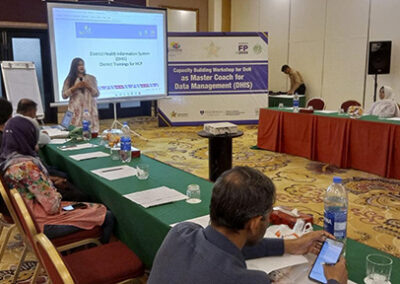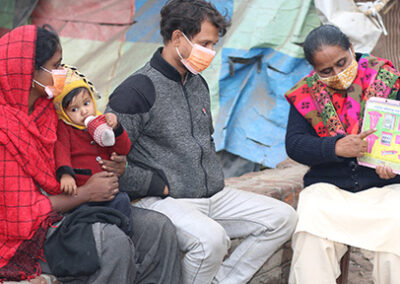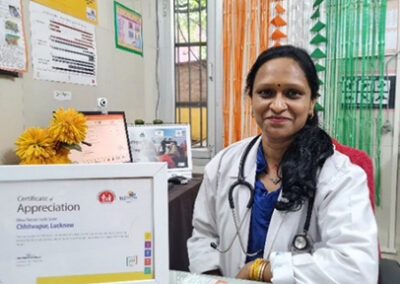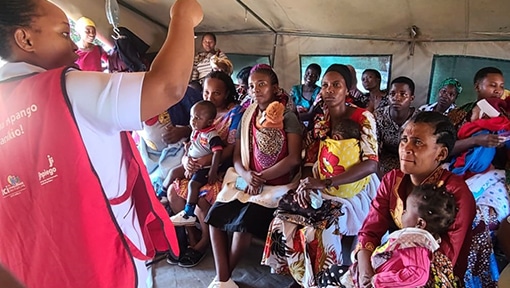
A counseling session during a TCI-supported integrated outreach.
Investing in family planning transforms the lives of women, families, communities, and countries. It is a development ‘‘best buy’’ and is key to accelerating progress toward the Sustainable Development Goals. Providing access to quality family planning services and integrated reproductive health services are among several investments’ local governments in Kenya, Uganda and Tanzania are making to improve the lives of women, men and young people.
Since 2017, The Challenge Initiative (TCI) has supported 63 East African local governments to strengthen their health systems, while contributing to an increase in the uptake of modern contraception methods. TCI’s locally led approach has enabled local governments with the opportunity to finance, design and lead the implementation of proven family planning interventions and practices.
(Source: TCI program data through December 2023)
Led by Jhpiego, TCI’s East Africa team has generated learnings on factors associated with successful practices from health systems, as well as facility and community perspectives to increase family planning access. Regarding sustainability, Dr. Anthony Khonde, the Senior Medical Officer of Mukono District in Uganda, said:
TCIs interventions are poised to be sustainable, with sustainability factored in at design stage, including its co-creation with Ministries of Health (MoH), involvement of scale-up partners in planning and implementation through country health systems.”
Local Commitments Lead to Ownership
With all engaged local governments, TCI provides seed funding in the form of a “Challenge Fund,” along with coaching and technical assistance on implementing TCI’s package of interventions, including adolescent and youth sexual and reproductive health (AYSRH) interventions focused on youth between 15-24 years old. In turn, local governments contribute their own financial and human resources to support implementation of family planning and AYSRH activities. This financial contribution often leads to family planning funds being ring-fenced in local budgets only to be used for family planning and AYSRH programs. Dr. Richard Walyomu, the Division Medical Officer of Kampala Central in Uganda, noted that:
Allocation of funds was generally for primary health with very little percentage for family planning services. Commodities for family planning were pushed to hospitals and facilities – little was done to ensure they were moved to the users.”
In Uganda, TCI’s 21 engaged local governments made financial commitments to improve their family planning indicators. Specifically, the local governments allocated and expended their financial resources to implement proven family planning practices and interventions. In the current fiscal year (2023/2024), Uganda local governments committed USD $277,292 to implement TCIs interventions with about USD $134,432 already spent.
Strengthening Capacity to Improve Service Delivery
Through TCI, local governments have also strengthened the capacity of health care providers and workers through its coaching approach to support the provision of modern contraception including the community health workers. In Tanzania, TCI-supported local governments demonstrate this approach. For example, in Ilala Municipal Council in Dar-es-Salaam, one health care provider shared her sentiments:
TCI’s support for training healthcare providers on long-acting reversible contraception methods helped us recognize the unique needs and concerns of women and young girls in our communities. This understanding improved the way we offered services through integration of services to ensure no missed opportunities.”
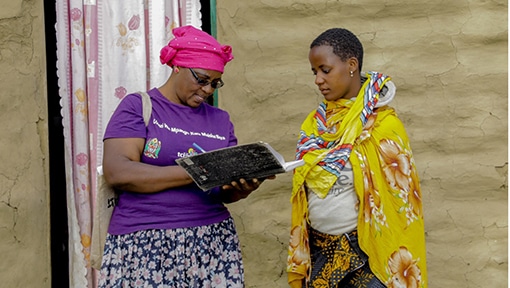
A community health worker during a routine household visit in Arusha, Tanzania.
In addition, capacity strengthening is key to providing quality family planning services. Quality translates to client satisfaction and increased access to modern contraception, as noted by Kylie Gyubi, a registered nurse at the Moivo Dispensary in Arusha, Tanzania:
We visited Ubungo, Kigamboni and Temeke municipalities where we were exposed to various key impact areas such as providing youth friendly services, empowering unskilled attendants on basic family planning information. We also learned how to conduct TCI interventions such as in-reaches and outreaches. Every day (of the visit) I imagined how helpful it would be if I adapted some of these best practices.”
Focus on Sustainability from the Outset
TCI plans on sustainability from the very beginning of its engagement as it transfers capacity to local government implementers and strengthens health systems. This effort is designed to ensure that TCI’s family planning and AYSRH interventions will sustain beyond the period of engagement – typically about 3.5 years. In Kenya, TCI used different approaches to increase investments in family planning for the long term. At the national level and within TCI-supported counties, TCI supported the institutionalization of family planning through the review and dissemination of relevant policies such as the FP Costed Implementation Plans. Ken Miriti, an AYSRH champion from Kilifi County. Kenya, said:
We needed family planning policies and frameworks developed to be disseminated as we had consultations on family planning services as a result of our outreach activities.”
Miriti was the first County Adolescent and Youth Reproductive Health Coordinator in Kilifi County. In 2019, when TCI first engaged Kilifi with AYSRH interventions, Miriti was at hand to support the development of the County’s first multisectoral collaboration framework. His dedication to adolescents and youths stems from witnessing the challenges faced by young girls as young as eleven giving birth, motivating him to work on reproductive health issues.
As a local government nears the end of its engagement, TCI works to ensure national and sub-national governments have invested enough in family planning to deliver on their commitments, and for policies to be in place to ensure lasting change. In East Africa, TCI interventions are now included within government workplans and strategic frameworks, ensuring the gains made do not diminish.
Measuring Progress towards Sustainability
To measure progress made towards sustainability, TCI developed the Reflection and Action to Improve Self-reliance and Effectiveness (RAISE) self-assessment tool that local governments use throughout their engagement with TCI to self-assess their performance in implementing sustainable family planning and AYSRH programs. In quarterly workshops, key health personnel use RAISE to evaluate the quality and effectiveness of their activities and implementation strength to make necessary course corrections.
As of December 2023, all local governments TCI had engaged in East Africa were conducting regular RAISE assessments. Results from the assessment indicated that within the period of engagement, the local governments had achieved an average of 80% (Figure 1) when assessing progress across TCI’s four sustainability domains: political and financial commitment, capacity (knowledge) transfer of family planning skills, institutionalization of TCI’s interventions at all levels of the health system, and sustained demand through improved attitudes and behaviors towards family planning.

Figure 1: Local governments in East Africa that have graduated from TCI’s direct support earned an average of 80% in the latest round of RAISE assessments.
This above chart showing sustained progress not only demonstrates the success of TCI’s approach, but also highlights the importance of ongoing support and resources for local governments. While TCI’s Challenge Fund support to a local government ends after about 3.5 years, resources such as TCI University and on-demand coaching remain accessible long after graduating from TCI support.
In Conclusion
The work undertaken by TCI through its East Africa hub underscores the transformative power of investing in family planning. By focusing on improving access to quality family planning services and integrated reproductive health services, local governments in Kenya, Uganda, and Tanzania are paving the way for positive change in the lives of women, men, and young people. TCI’s locally led approach, supported by seed funding and technical assistance, has not only increased the uptake of modern contraception methods but has also fostered ownership and sustainability within communities. Through capacity strengthening and a focus on sustainability from the outset, TCI is ensuring that the gains made in family planning and AYSRH endure beyond its direct engagement. The commitment of local governments, coupled with ongoing support and resources provided by TCI, exemplifies the potential for lasting impact in advancing progress towards the Sustainable Development Goals and improving the well-being of communities across East Africa.

